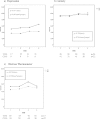Distress, anxiety and depression in patients with brain metastases before and after radiotherapy
- PMID: 25266325
- PMCID: PMC4192799
- DOI: 10.1186/1471-2407-14-731
Distress, anxiety and depression in patients with brain metastases before and after radiotherapy
Abstract
Background: Many patients with cancer suffer from distress, anxiety and depression. However, studies on patients with brain metastases are lacking. In this exploratory study we prospectively assessed distress, anxiety and depression in patients with brain metastases from different solid primary tumour treated with radiotherapy to the brain.
Methods: Patients were recruited between May 2008 and December 2010. Distress, anxiety and depression were subjectively evaluated before radiotherapy, 6 weeks, 3 months and 6 months after radiotherapy using the validated National Comprehensive Cancer Network Distress Thermometer (DT) and the Hospital Anxiety and Depression Scale (HADS). The treatment group consisted of adult patients (n = 67) with brain metastases who were treated with whole-brain radiotherapy (n = 40) or hypofractionated stereotactic radiotherapy (n = 27). The control group comprised of patients (n = 32) diagnosed with breast cancer without cranial involvement who received adjuvant whole breast radiotherapy. Forty-six patients (24 in the treatment group) completed the study after six months.
Results: Before radiotherapy, the treatment group experienced higher distress than the control group (p = 0.029). Using a cut-off ≥ 5, 70% of the treatment group were suffering from significant distress (66% of the control group). No significant time-by-group interaction on distress, anxiety and depression was observed. At all time points, a high proportion of patients reported psychological stress which featured more prominently than most of the somatic problems. Global distress correlated strongly with the Hospital Anxiety score before radiotherapy, but only moderately or weakly with both HADS scores after radiotherapy with the weakest association 6 months after radiotherapy.
Conclusion: In conclusion, the course of distress, anxiety and depression does not differ significantly between patients with brain metastases and breast cancer patients without cranial involvement. This finding suggests that both groups need similar psychological support during their treatment. Both screening instruments should be used as they cover different facets of distress.
Figures
References
-
- Tsao MN, Rades D, Wirth A, Lo SS, Danielson BL, Gaspar LE, Sperduto PW, Vogelbaum MA, Radawski JD, Wang JZ, Gillin MT, Mohideen N, Hahn CA, Chang EL. Radiotherapeutic and surgical management for newly diagnosed brain metastasis(es): an American society for radiation oncology evidence-based guideline. Pract Radiat Oncol. 2012;2(3):210–225. doi: 10.1016/j.prro.2011.12.004. - DOI - PMC - PubMed
-
- Waller A, Williams A, Groff SL, Bultz BD, Carlson LE. Screening for distress, the sixth vital sign: examining self-referral in people with cancer over a one-year period. Psychooncology. 2011;2:388–395. - PubMed
Pre-publication history
-
- The pre-publication history for this paper can be accessed here:http://www.biomedcentral.com/1471-2407/14/731/prepub
Publication types
MeSH terms
LinkOut - more resources
Full Text Sources
Other Literature Sources
Medical


